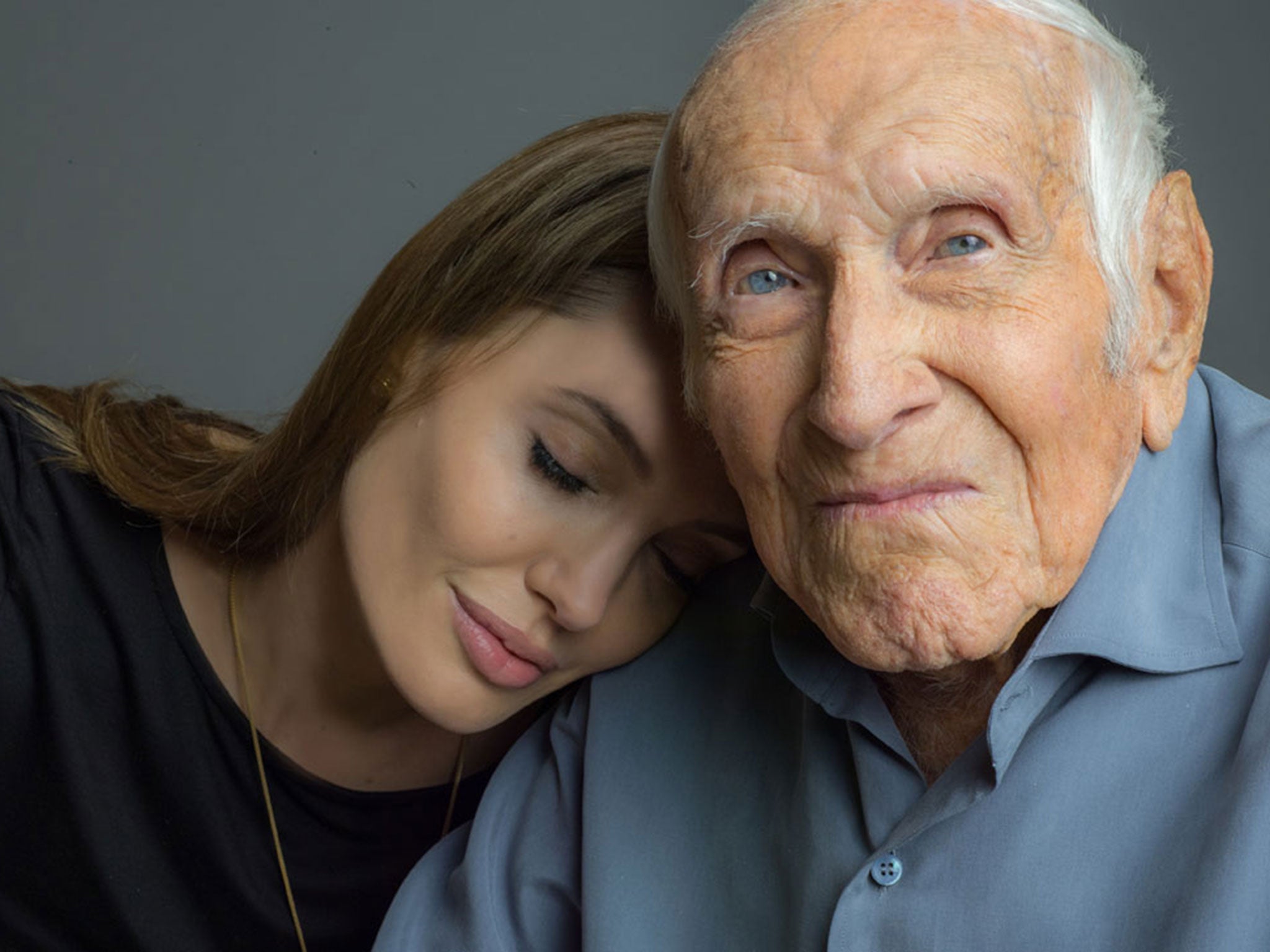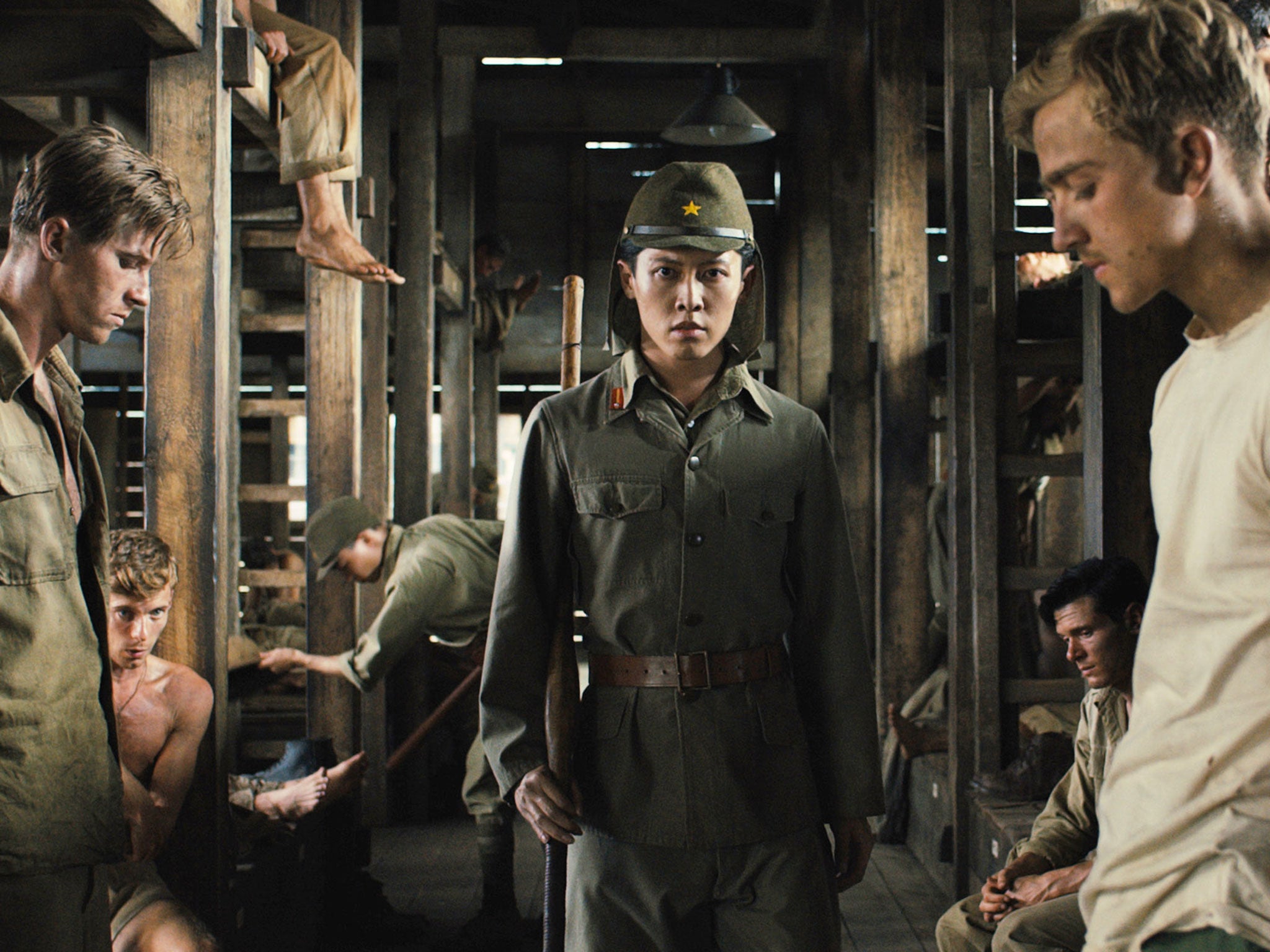Unbroken: Angelina Jolie war film accused of being ‘racist’ and ‘anti-Japanese’
After more than a year of controversy there is widespread anger in Tokyo at a screening of the POW movie

In Angelina Jolie’s war film Unbroken, the American prisoner of war, Louis Zamperini, is sent to Naoetsu, a Japanese camp in this sleepy coastal town. Starved and beaten by a sadistic camp guard, he barely survives.
Zamperini’s story, with its stirring motifs of bravery and survival, was turned into a bestselling book in 2010 and translated into 30 languages. Since it was released in 2014, Unbroken has been screened around the world. Everywhere, that is, but Japan.
The film was stopped in its tracks by a right-wing campaign that branded it “anti-Japanese”. Nationalists call the depiction of Japanese soldiers in the movie “racist” and say Ms Jolie “hates” Japan.
Now, after over a year of controversy a small independent distributor has stepped in and the film will be shown for the first time in an central Tokyo art-house.
Ultra-rightists are threatening to picket the venue using sound trucks – vehicles equipped with high-decibel loudspeakers that drown out other noise – and shut the film down before it is rolled out to other theatres around Japan.
Watch the trailer for Unbroken
Jack O’Connell plays the role of Zamperini, a long-distance runner who qualified for the 1936 Berlin Olympics and met Adolf Hitler. Before being captured by Japanese soldiers, he survived 47 days adrift on a raft in the Pacific.
Japan has produced much of the top scholarship on the war, critical or otherwise, and its film studios have produced a string of anti-war classics. Foreign movies showing mistreatment of POWs, including the British made The Railway Man (staring Colin Firth and Nicole Kidman) have been screened in the country.
But reflection, never easy, has long battled official amnesia. In the area around Naoetsu, few seem even aware of the camp or that it has been immortalised in a Hollywood movie. The local library doesn’t have a single record of Zamperini.

“I don’t think people care about something that happened so long ago,” says Yukiko Ishida, who runs a coffee shop half a mile from where the camp once stood. Others say they were not even aware that Americans were held in Japanese prisons.
Unbroken is hobbled by not including a single sympathetic Japanese character. Its on-screen depiction of the torture of an Olympian is also uncomfortable viewing in a country increasingly disinclined to look at its past, while looking forward to hosting its second Olympics in 2020.
Zamperini was one of 30,000 POWs in Japan, of whom 10 per cent died, says Kinue Tokudome, executive director of the US-Japan Dialogue on POWs.
“People don’t know that history,” she laments. “They must have seen these emaciated Caucasians in the countryside. How could they not remember and talk about it?”
Some 60 Australians died from disease and mistreatment at the Naoetsu camp from 1942-45. When the war ended, eight guards were tried and executed, more than from any other POW Camp in Japan. Zamperini’s tormentor, Mutsuhiro Watanabe, nicknamed “the Bird”, was never brought to justice, however.
A small park marks the spot where the camp once stood. Locals, working with the families of former Australian prisoners, created the monument in 1995. But many of the people who fought to have it built have passed away.
Japan’s historical amnesia is accelerating under Prime Minister Shinzo Abe, says Mindy Kotler, director of the Washington-based think-tank Asia Policy Point.
“The Abe administration has walked back on every aspect of accountability for the war,” she says.
Earlier this year, Japan’s education ministry ordered that school textbooks must reflect the government position on history and territorial issues, watering down references to the war.
Mr Abe has already partially satisfied a key demand of his supporters – that Japan end the shameful apology diplomacy of the post-war years. Mr Abe has stopped short of offering his own words of remorse and said Japan “must not let... generations to come... be predestined to apologise.”
A panel of experts is probing the verdicts of the International Military Tribunal for the Far East (1946–1948). The verdicts, which condemned Japan’s six wartime leaders to death, were “based on a poorly constructed” perception of history, said Inada Tomomi, a close colleague of Mr Abe.
South Korea has responded to Japan’s textbook changes by announcing that schoolteachers will be given dedicated training on the history of Japan’s wartime military brothels. In China, schools already study Japanese invasions of the 1930s and 1940s.
Unbroken should resonate beyond national borders because its central character embraced reconciliation. Zamperini, who died in 2014, aged 97, later went to Japan to meet his captors. During the Nagano Olympics of 1988, he carried the Olympic torch.
Ms Tokudome says there is still some space in Japan to discuss what occurred in the 1930s and ’40s but worries that this space may be closing. Young Japanese people, she laments, “have very few opportunities to learn about the history that took place in their country”.
Join our commenting forum
Join thought-provoking conversations, follow other Independent readers and see their replies
Comments
Bookmark popover
Removed from bookmarks